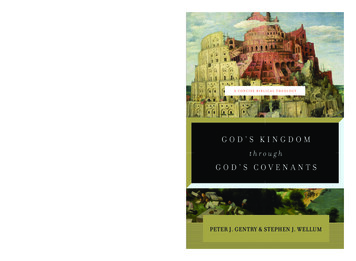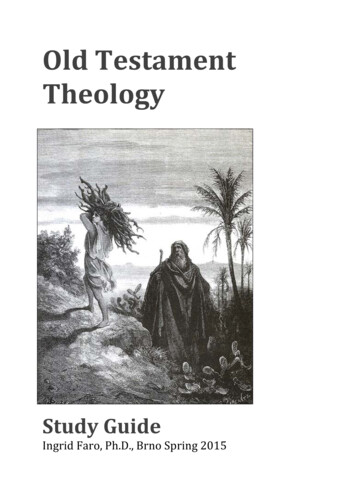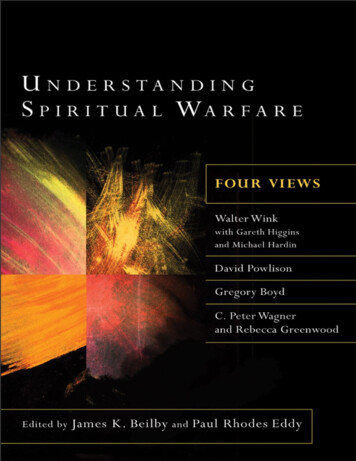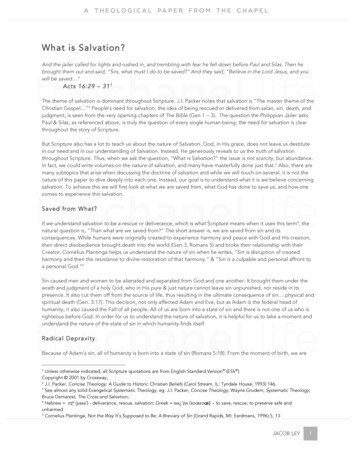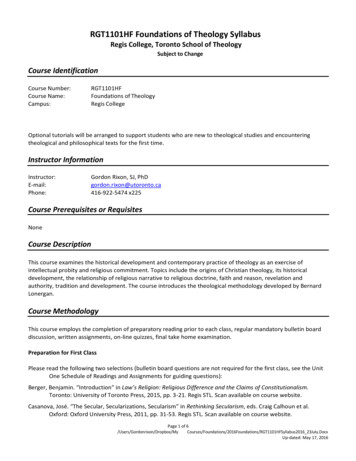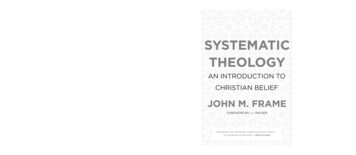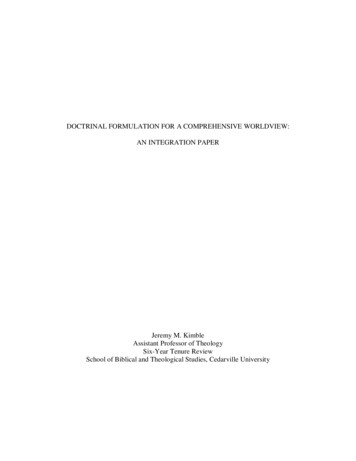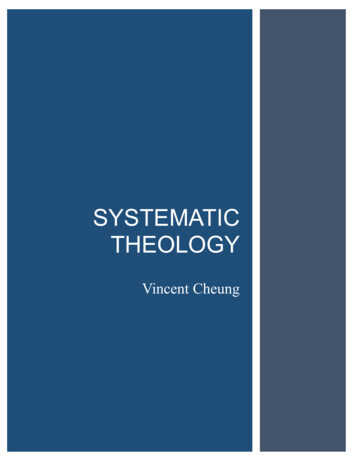
Transcription
Spiritual TheologyByJORDAN AUMANN, O.P.PrefaceThe present volume was written in response to numerous requests for a complete and definitivework on Christian spirituality. It is not an entirely new work, however, for some sections aretaken substantially from The Theology of Christian Perfection by Antonio Royo and JordanAumann, published in 1962 by Priory Press.Spiritual theology is both speculative and practical, but it is eminently practical because it dealswith Christian life in relation to the perfection of charity. Consequently, the study of the theologyof Christian perfection should proceed scientifically and systematically, although its aim is not toproduce scholars but to form holy Christians. Therefore the first part of this volume investigatesthe theological principles of Christian holiness; the second part deduces from those principles thegeneral directives by which souls can be guided in their journey to the goal of the Christian life.The theology contained in this volume is based on the spiritual doctrine of three Doctors of theChurch: St. Thomas Aquinas, St. John of the Cross, and St. Teresa of Avila. Moreover, it is fullyin accord with the teaching of John G. Arintero and Reginald Garrigou-Lagrange.A final word of thanks is due to Laura Gillet, John Osman, Michael Balaria, and Sister VeronicaMarie. They were most generous in contributing their time and labor in the typing of themanuscript.JORDAN AUMANN. O.P.In Spiritual Theology Father Jordan Aumann dispels the common misconception that asceticaland mystical theology is for the select few. He reminds us that "the real purpose of the study ofthe spiritual life is not to produce scholars but to form holy Christians."Basing much of his work on St. Thomas Aquinas, St. John of the Cross, and St. Teresa, FatherAumann proves that Christian perfection consists especially in charity, a charity richly rewardedin spiritual graces.He presents the most complete and systematic treatment of spiritual theology since Vatican II.Comprehensive in scope, it meets the needs of seminarians, professors of spiritual theology,spiritual directors, and retreat masters. This classic will also appeal to the educated readerseeking a richer and fuller spiritual life.JORDAN AUMANN, O.P. is a native of the United States and Director of the Institute ofSpirituality at the Pontifical University of St. Thomas Aquinas in Rome. He is also a Consultorfor the Sacred Congregation for the Clergy and Catechetics and likewise a Consultor for theSacred Congregation for Evangelization. Since 1977 he has been giving special courses inspirituality at the Faculty of Theology of the University of Santo Tomas, Manila, where he is an
honorary professor. He has likewise travelled extensively throughout the Philippines to giveretreats to the clergy, and retreats and special series of lectures to religious and seminarians.Father Aumann has also written the book History of Spirituality published in the Philippines bySt. Paul Publications.CONTENTSPART ONE: DOCTRINAL FOUNDATIONSPreface1.Nature and Scope of Spiritual TheologyTerminologySpirituality and TheologyDefinition of Spiritual TheologyTheological MethodSources of Spiritual TheologySchools of Spirituality2.The Goal of Our StrivingThe Glory of GodSalvation - The Life of GlorySanctification3. Our Life in Christ and MaryScriptural TestimonyChrist the WayChrist the TruthChrist the LifeThrough Him, With Him, In HimMary - Mother and Mediatrix4. The Supernatural OrganismSanctifying GraceEffects of Grace
Indwelling of the TrinityActual GraceThe Infused VirtuesThe Gifts of the Holy SpiritFruits of the Spirit and Beatitudes5. Perfection of the Christian LifeThe Nature of Christian PerfectionSpecial Questions6. Christian Perfection and Mystical ExperienceMystical ExperienceThe Mystical State and Christian PerfectionPART TWO: GROWTH IN HOLINESS7. Conversion From SinThe Psychosomatic StructureThe Struggle Against SinTemptations8. Progressive PurgationPurification of the External SensesPurification of the Internal SensesPurification of the PassionsPurification of the IntellectPurification of the WillPassive Purgations9. Means of Spiritual GrowthThe SacramentsMeritorious Good WorksPrayer of Petition
10. The Theological VirtuesFaithThe Gift of UnderstandingThe Gift of KnowledgeHopeThe Gift of FearCharityThe Gift of Wisdom11. The Moral VirtuesPrudenceThe Gift of CounselJusticeThe Gift of PietyTemperanceThe Gift of FearFortitudeThe Gift of Fortitude12. Grades of PrayerVocal PrayerMeditationAffective PrayerPrayer of SimplicityContemplative PrayerPrayer of QuietPrayer of UnionPrayer of Conforming UnionPrayer of Transforming Union
13. Aids to Spiritual GrowthThe Presence of GodExamination of ConscienceThe Desire for PerfectionConformity to God's WillFidelity to GracePlan of LifeSpiritual ReadingHoly FriendshipsSpiritual Direction14. Discernment of SpiritsTypes of SpiritsPsychosomatic PhenomenaExtraordinary Mystical PhenomenaDoctrinal Foundations1Nature and Scope of Spiritual TheologyAlthough treatises on the spiritual life can be found in the writings of the earliest theologians andFathers of the Church, spiritual theology did not emerge as a distinct and well-defined branch ofsacred doctrine until the eighteenth century. Traditionally, sacred doctrine possessed aremarkable unity that was at once the test of doctrinal orthodoxy and a sign of authentic theology-- the science that studies God and all things in relation to God.However, by the time of the Council of Trent (1545-1563), the attacks of heresy and thechanging political, cultural, and religious conditions made it necessary for theologians toinvestigate the truths of faith more deeply. The result was that sacred doctrine gradually becamemore diversified, and was ultimately divided into areas of specialization or distinct branches ofthe one theology.TerminologyWhat is now called spiritual theology has been designated by various names throughout thehistory of theology. Some have called it simply spirituality; others have named it spiritual life;
devout life; supernatural life; interior life; mystical evolution; and theology of Christianperfection. The terms first used and still commonly used to designate the systematic theology ofthe spiritual life are ascetical theology and mystical theology, although these words do not havethe same meaning for all theologians.The word ascetical comes from the Greek askeein, meaning to practice or exercise in order toacquire a skill, especially an athletic skill. Later the word came to mean the study of philosophyor the practice of virtue, and it was used in this sense by Greek philosophers. St. Paul uses theword only once, in Acts 24:16, but he frequently draws the comparison between the practices ofthe Christian life and athletic exercises (1 Cor. 9:24-27; Phil. 3:13-14; 2 Tim. 4:28; gimnazein in1 Tim. 4:7-8, Heb. 5:14, and 12:11 designates spiritual striving). Among the early Christians thename ascetics was given to those who observed continence under the vow of chastity, fromwhich it was ultimately applied to the practices of the monastic life. It seems that a PolishFranciscan named Dobrosielski introduced the word ascetical into the Latin usage of westerntheology in 1655, and between 1752 and 1754 the Italian Jesuit Scaramelli used the term incontradistinction to the older word mystical.The term mystical, also from the Greek (mystikos), originally referred to secret or hidden ritesknown only to the initiated. The noun mysterion is used in the Book of Daniel and also in theDeuterocanonical books; in the New Testament it is used by St. Paul to signify a secret of Godpertaining to man's salvation, the hidden or symbolic sense of a narration, or anything whoseactivity or power is hidden. The adjective mystical is not found in the New Testament or in thewritings of the Apostolic Fathers; it was introduced only in the third century, and with thepassage of time it assumed three meanings: liturgically, it referred to religious cult; exegetically,it signified an allegorical or a typical interpretation of Scripture as distinct from the literal sense;theologically, it meant a more profound knowledge of the truths of faith -- knowledge not sharedby all.In the fourth century the expression mystical theology is found in the writings of MarcellusAncyranus; in the fifth century, in the writings of Marcus Eremita; and the expression wasintroduced into western theology at the beginning of the sixth century by the PseudoDionysius,author of De mystica theologia. By this time the word mystical designated not only the superiorand deeper knowledge formerly known as gnosis but also an experiential, intuitive knowledge ofthe divine. Gradually the word was identified with contemplation, and treatises on the subjecttended to become more abstract and scientific.John Gerson (1363-1429), chancellor of the University of Paris, made a further distinction in histreatise, On Mystical Theology, Speculative and Practical, and speculative mystical theology wasextended to include the whole theology of the spiritual life, from first conversion to the fullexperience of the mystical life. Early in the 1750s Scaramelli introduced the distinction betweenascetical and mystical theology, and the latter was again restricted to the study of contemplationand the extraordinary mystical graces. In modern times two Dominicans, ReginaldGarrigou-Lagrange and John Arintero, defended and restored the traditional teaching: there is butone path to Christian perfection, though it admits of ascetical and mystical stages, and themystical life is not the result of extraordinary graces but the normal development and perfectionof the grace received by every Christian at baptism. Vatican Council II made this same doctrineits own when it stated:
The Lord Jesus, divine teacher and model of all perfection, preached holiness of life (ofwhich he is the author and maker) to each and every one of his disciples withoutdistinction: "In a word, you must be made perfect as your heavenly Father is perfect"(Matt. 5:48). For he sent the Holy Spirit to all to move them interiorly to love God withtheir whole heart, with their whole soul, with their whole understanding, and with theirwhole strength (cf. Mark 12:30), and to love one another as Christ loved them (cf. John13:34; 15:12) . It is therefore quite clear that all Christians in any state or walk of lifeare called to the fullness of Christian life and to the perfection of love . The forms andtasks of life are many but holiness is one -- that sanctity which is cultivated by all who actunder God's Spirit and, obeying the Father's voice and adoring God the Father in spiritand in truth, follow Christ, poor, humble and cross-bearing, that they may deserve to bepartakers of his glory.(1)In view of the historical development of the terminology, it is not surprising that moderntheologians do not agree on the meaning of the words ascetical and mystical. All the morereason, then, for students of ascetico-mystical theology to familiarize themselves with thevariations in vocabulary before attempting to evaluate an author's teaching.Modern authors will usually fall into one of the following categories in their use of the wordsascetical and mystical:1. The terms are convertible, and either one can be used to designate the entire field of spiritualtheology.2. Ascetical theology studies the spiritual life from its beginning to the threshold of infusedcontemplation; mystical theology treats the stages of infused contemplation, passive purgation,and the transforming union.3. Ascetical theology investigates the purgative, illuminative, and unitive ways so far as ordinarygrace is the operative principle in each; mystical theology is restricted to infused contemplationas an effect of extraordinary grace and to the epiphenomena that sometimes accompany infusedcontemplation.4. Ascetical theology treats of the purgative and illuminative ways; mystical theology studies theunitive way.5. The distinction between the ascetical and the mystical aspects of the spiritual life isdetermined by the predominance of the acquired and infused virtues (ascetical theology) or thepredominance of the gifts of the Holy Spirit (mystical theology).Other theologians, fundamentally in agreement with this teaching, distinguish between theactivity and passivity of the soul so far as it operates under grace and the virtues (ascetical) orunder the movement of the Holy Spirit through his gifts (mystical).6. In Protestant theology the word asceticism usually refers to the practices of mortification andself-denial; mysticism signifies any experiential knowledge of suprasensible things, includingoccultism,, spiritualism, religious ecstasy, and extraordinary psychic phenomena. Manycontemporary Protestant theologians reject the terms ascetical and mystical and prefer to speakof piety, pietism, or Christian lifestyle.
Because of the discrepancies in the use of the terms ascetical and mystical, there is nouniversally accepted name for the theology of Christian perfection. We prefer the succinct title,spiritual theology. It has the advantage of including both the ascetical and the mystical elementsof the Christian life without implying an exaggerated dichotomy between the two. Moreover, itemphasizes the fundamental unity of the spiritual life, which culminates in the same perfectionfor all; it signifies that this perfection is a spiritual or supernatural perfection; and it classifies thetheology of Christian holiness as a branch or specialization of theology.The distinction between the ascetical and the mystical is not without foundation on the existentiallevel, for at any given moment in the spiritual life the ascetical or the mystical aspect willpredominate, and therefore it is perfectly legitimate to isolate one from the other for the purposesof investigation. However, the total view, of the spiritual life should always embrace bothaspects, since mysticism cannot be understood -- much less experienced -- without a concomitantasceticism, and any authentic Christian asceticism contains within itself the seed of the mysticalexperience.Spirituality and TheologyTo formulate a definition of spiritual theology it is first necessary to make some precisionsconcerning the concepts spirituality and theology as they apply to the study of Christianperfection. In its widest sense, spirituality refers to any religious or ethical value that isconcretized as an attitude or spirit from which one's actions flow. This concept of spirituality isnot restricted to any particular religion; it applies to any person who has a belief in the divine ortranscendent, and fashions a lifestyle according to one's religious convictions. In this context onecan speak of Zen, Buddhist, Jewish, and Muslim spirituality as well as Christian spirituality.However, the comparative study of Christian and non-Christian spiritualities belongs to the fieldof religious psychology rather than theology. Spirituality does not become an area of theologicalstudy .and investigation until it fits the description given by Paul Evdokimov: "the life of manfacing his God, participating in the life of God; the spirit of man listening for the Spirit ofGod."(2) The spiritual life in this more restricted sense is a supernatural life, and this seems to bein accord with biblical usage, where the word spiritus or pneuma refers to a divine power andtherefore to the supernatural.In the strict sense of the word, the only authentic spirituality is a spirituality centered in JesusChrist and through him to the Trinity. This is true not only because created grace, the vitalprinciple of the spiritual life, comes to us only through the mediation of Jesus Christ, but alsobecause those who cultivate the spiritual life must consciously or unconsciously follow theteachings of Christ, regardless of :their religious affiliation. Vatican Council II has promulgatedthis ,doctrine in the declaration on non-Christian religions:The Catholic Church rejects nothing of what is true and holy in these religions. She has ahigh regard for the manner of life and conduct, the precepts and doctrines which,although differing in many ways from her own teaching, nevertheless often reflect a rayof that truth which enlightens all men. Yet she proclaims and is in duty bound to proclaimwithout fail, Christ who is the way, the truth and the life (John 14:6). In him, in whomGod reconciled all things to himself (2 Con 5:18-19), men find the fullness of thereligious life.(3)
Again, speaking of the Church in the modern world, the Council affirms that there is only onespirituality for all, and it consists in a participation in the mystery of Christ:In reality it is only in the mystery of the Word made flesh that the mystery of man trulybecomes clear . Christ the Lord . fully reveals man to himself and brings to light hismost high calling . The Christian is certainly bound both by need and by duty tostruggle with evil through many afflictions and to suffer death; but, as one who has beenmade a part in the paschal mystery, and as one who has been configured to the death ofChrist, he will go forward, strengthened by hope, to the resurrection. All this holds truenot for Christians only but also for all men of good will in whose hearts grace is activeinvisibly. For since Christ died for all, and since all men are in fact called to one and thesame destiny, which is divine, we must hold that the Holy Spirit offers to all thepossibility of being made partners, in a way known to God, in the paschal mystery.(4)Christian spirituality is therefore a participation in the mystery of Christ through the interior lifeof grace, actuated by faith, charity, and the other Christian virtues. The life that the individualreceives through participation in Christ is the same life that animated the God-man, the life thatthe Incarnate Word shares with the Father and the Holy Spirit; it is, therefore, the life of God inthe august mystery of the Trinity. Through Christ, the spiritual life of the Christian is eminentlyTrinitarian.The difficulty in constructing a theology of the spiritual life consists in the fact that the spirituallife is at once a mystery and a problem. It is a mystery precisely because it is life, indeed divinelife, a sharing in the Christ-life. Thus, St. John says: "Whatever came to be in him, found life,life for the light of men. The light shines on in darkness, a darkness that did not overcome it"(John 1:4-5). St. Paul writes: "Your life is hidden now with Christ in God" (Col. 3:3). Althoughone may experience this life in the depths of his being as a life of union with God, it isnevertheless ineffable because the supernatural and the divine transcend human comprehension.For this reason the mystics made use of such expressions as "ray of darkness," "negativetheology," and "cloud of unknowing."Spirituality becomes a "problem" when it is made the object of study and investigation, and thisinvolves a transition from life to doctrine, from the intuitive knowledge of experience to thescientific knowledge of systematic theology. Accordingly, the field of spiritual literature can bedivided into three types of writing: (1) that which exhorts the reader to greater perfection andprovides instruction for that purpose; (2) that which records and describes the religiousexperience of holy Christians and mystics; and (3) that which makes a scientific study of thenature of Christian perfection and the means to attain it.The first type of writing is exemplified by The Imitation of Christ, Introduction to the DevoutLife, and the works of Louis of Granada. The second type comprises autobiographical accountscomposed by mystics themselves or special studies by experts in the field of religiousexperience. The third type includes systematic studies of spirituality, and this is spiritualtheology in the strict sense, as evidenced in the works of John Arintero, ReginaldGarrigou-Lagrange, Auguste Poulain, and Adolphe Tanquerey. Sometimes, however, a workmay be a combination of several types of writing. Thus, the writings of St. Teresa of Avila areboth instructive and autobiographical (the first and second types), whereas the treatises of St.John of the Cross are a combination of all three types, but predominantly instructive and
scientific.The present volume treats of spirituality in a scientific manner, and since its object ofinvestigation is the spiritual life, which is of the supernatural order, the only way to study itscientifically is by the way of theology. Therefore, the method of investigation must be one thatis proper to theology. Finally, the conclusions drawn from the study must be general enough toserve as norms or directives of the spiritual life, since we are dealing with an applied and apractical science. Unless these requisites are met, there can be no possibility of a spiritualtheology.Without going into the history of the origin and uses of the word theology, it should be noted thatthe nature and methods of theology have been subjected to rigorous scrutiny by numerousmodern theologians. The traditional concept of theology was that of a science that studies God asrevealed to mankind in the mysteries of his intimate life and all things else as related to God. ForSt. Thomas Aquinas, an outstanding exponent of the traditional concept, sacred doctrine isprincipally a speculative science because it seeks knowledge through causes and deducesconclusions from principles according to the rules of logic.The primary function of the theologian is to investigate the truths of divine revelation, arrangethem according to a logical subordination, and arrive at conclusions that are substantiated by thecertitude of faith and the rational process of demonstration. Etienne Gilson applied thistraditional concept of theology to the theology of the spiritual life in the following way:Since this life is ultimately nothing other than a communication of divine life to the soul,everything that one says of it enters directly into our science of God, which is theology. Since it is the question of a science, this teaching will treat of the nature of the divinelife and the general laws according to which it is communicated to the human soul; sinceit is the question of a science that is principally speculative, this teaching will beconcerned primarily with the theoretical knowledge of this nature and of these laws; andsince, finally, it is the question of a sacred science, and very particularly of a part oftheology, this teaching will have no other method than that of theology itself: it willproceed dogmatically, starting from the word of God, of which the Church is thecustodian and interpreter .Based as it is on the authority of the word of God, thetheology of the spiritual life itself proceeds by the way of authority . It statesdogmatically the laws which every authentic spiritual life ought to obey, because theselaws are deduced from its origin and its end.(5)However, in spite of the clarity and certitude that proceed from the logical demonstration used inScholastic theology, some modern authors have raised objections to the Scholastic method andhave argued that spiritual theology should be described as theology in a wider and more flexiblecontext. First, they maintain that this is the only way to avoid an a priori definition of spiritualtheology. Second, the Scholastic emphasis on the unity of theology seems to obliterate thedistinction between spiritual theology and the other branches of theology. Third, and mostimportant, the spiritual life is a dynamic and interior mystery that accommodates itself to thepersonality and existential situation of the individual Christian; therefore the theology of thespiritual life ought to treat of individual cases, particular charisms, and extraordinaryphenomena, which do not pertain to theology as a science.
We are thus confronted with the perennial problems of the knowledge of particulars within thescope of a given science and the application of general laws to individual cases. Some moderntheologians are seeking what Yves Congar described as a reflective type of theology that"philosophizes on the whole Christian reality, illuminated, if you will, by the existentialexperience of man."(6) To justify their claim, they will point to the different approach andmethod in the works of St. John of the Cross as compared with the Summa theologiae of St.Thomas Aquinas.The basic issue is the distinction between systematic moral theology and the practical,specialized theology of the spiritual life. Some years ago the question was disputed at length byrenowned theologians such as Santiago Ramirez, Jacques Maritain, Reginald Garrigou-Lagrange,and Gabriel of St. Mary Magdalen, but rather than repeat all the arguments, it will suffice toquote the conclusions of Reginald Garrigou-Lagrange:Theology is the science of God. We distinguish between natural theology or theodicy,which knows God by the sole light of reason, and supernatural theology, which proceedsfrom divine revelation, examines its contents, and deduces the consequences of the truthsof faith.Supernatural theology is usually divided into two parts, dogmatic and moral. Dogmatictheology has to do with revealed mysteries, principally the Blessed Trinity, theIncarnation, the Redemption, the Holy Eucharist and the other sacraments, and the futurelife. Moral theology treats of human acts, of revealed precepts and counsels, of grace, ofthe Christian virtues, both theological and moral, and of the gifts of the Holy Spirit,which are principles of action ordained to the supernatural end made known by revelation.Moral theology thus understood evidently contains the principles necessary for leadingsouls to the highest sanctity. Ascetical and mystical theology is nothing but theapplication of this broad moral theology to the direction of souls toward ever closer unionwith God. It presupposes what sacred doctrine teaches about the nature and properties ofthe Christian virtues and of the gifts of the Holy Spirit, and it studies the laws andconditions of their progress from the point of view of perfection.To teach the practice of the highest virtues and perfect docility to the Holy Spirit and tolead to the life of union with God, ascetical and mystical theology assembles all the lightsof dogmatic and moral theology, of which it is the most elevated application and thecrown.(7)The foregoing statement demonstrates clearly that the study of the spiritual life is truly a branchof theology, but a question remains: how can spiritual theology as a science treat of the spirituallife as lived on the existential level pf the individual person? It would seem that personalexperience lies outside the domain of spiritual theology as a science; it belongs to the area ofprudence and is therefore the concern of spiritual directors rather than theologians. However, theanswer to the question depends on the place we give to subjective experience in spiritualtheology, and since experience pertains to the psychological order, it is ultimately a question ofthe role of psychological data in ascetical and mystical theology.
It is true that there can be no science of singulars, and therefore subjective experience does notfall under the scope of theology as a science. Nevertheless, the psychological data of the spirituallife do have a scientific value if they manifest a certain universality in the spiritual life and if thisis demonstrable by means of a methodical process of induction. Then, when these psychologicaldata are synthesized with theological principles, the experience as thus interpreted hastheological value. For example, St. John of the Cross relates the psychological effects of the darknights to the movement of the Holy Spirit, who more and more directs the soul but does notimpede psychological reactions. Thus, spiritual theology deals directly with the psychologicaldata of the spiritual life, and in so doing it adds to the principles of moral theology theexperiential or existential element that constitutes spiritual theology as a combination ofspeculative and practical theology. To summarize, spiritual theology comprises three elements:(1) the psychological data of spiritual experience; (2) the application of theological principles;and (3) practical directives concerning progress in the spiritual life with a view to Christianperfection.Definition of Spiritual TheologyIn view of the foregoing distinctions, spiritual theology can be described in general terms as theapplication of moral theology to the spiritual lives of individual Christians with a view to leadingthem to the-perfection of the Christian life. More precisely, spiritual theology is that part oftheology that, proceeding from the truths of divine revelation and the religious experience ofindividual persons, defines the nature of the supernatural life, formulates directives for itsgrowth and development, and explains the process by which souls advance from the beginning ofthe spiritual life to its full perfection. A brief comment on each phrase of the definition willsuffice to explain the subject matter and purpose of this branch of theology and to show itsrelationship to other parts of theology.In saying that spiritual theology is a part of theology, we admit some degree of distinctionbetween spiritual theology and the other branches of sacred doctrine, not as a specifically distinctscience, but as a field of specialization. Theology itself is one because it has a unique object,namely, the revealed mystery of God as known by human reason through the divine revelationaccepted in faith. But theology is also sacred wisdom and in that respect it comprises acomplexity of elements that allow for a plurality of disciplines within the one sacred science,subordinating them to the purpose of the one theology and at the same time respectin
The theology contained in this volume is based on the spiritual doctrine of three Doctors of the Church: St. Thomas Aquinas, St. John of the Cross, and St. Teresa of Avila. Moreover, it is fully in accord with the tea
